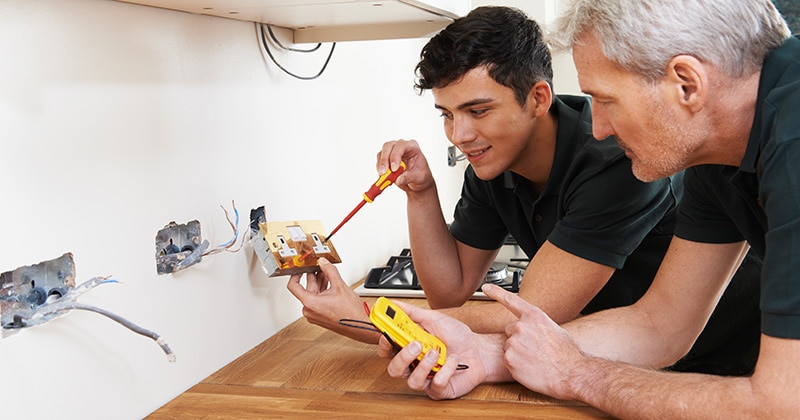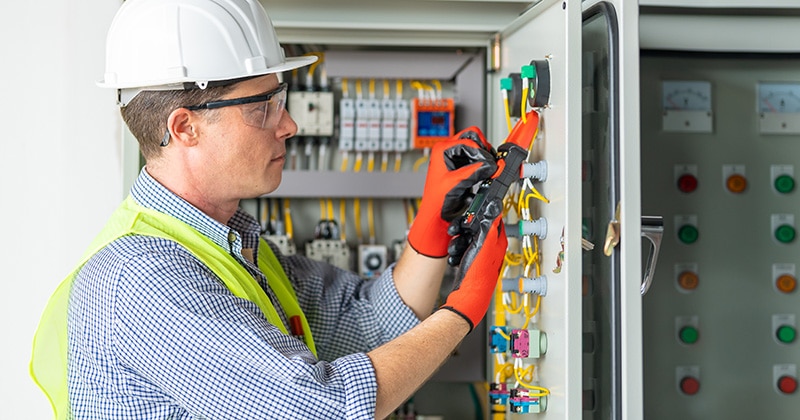
Working as an electrician can be incredibly rewarding.
Demand is high, the pay is good, and no two days look alike. Your work is hands-on, and there are plenty of career advancement opportunities. You could even start your very own business.
On top of all this, you get to help people. You make a real difference in their lives. You keep people safe and make their living or working environments more comfortable.
If you’re considering a career as an electrician but unsure where to start, this guide is for you.
In this article, we’ll break down the process in clear stages.
We’ll explain the importance of conducting thorough market research. We’ll share the educational, licensing, and certification requirements.
We’ll also explore the pros and cons of being self-employed and working for a business. Lastly, we’ll share some actions you can take today to get started.
Your future looks bright. Here’s how to get an electrician license.
Research the Electrical Industry
Researching the electrical industry is the first step to becoming a successful electrician.
Why? Because knowing the industry inside and out helps you understand different career paths. It allows you to see various opportunities and decide what suits you best.
You will also learn which certifications and training programs are essential for your chosen path.
You can identify trends, too. For example, the demand for energy-efficient electrical systems has increased. This means electricians who specialize in these systems are in high demand.
This is just one type of specialty. There are plenty more to choose from, including:
- Residential: These electricians work in homes. They install wiring, lighting, and electrical systems. They’re often involved in new home construction or renovation projects.
- Commercial: These electricians operate in business settings like offices and stores. They tend to handle more complex systems compared to residential electricians.
- Industrial: These electricians work in factories and plants. They deal with heavy machinery and equipment. This specialty may require knowledge of robotics and industrial systems.
- Maintenance: These electricians make sure electrical systems and equipment are working well. They do this with regular inspections and repairs. They can work in many different settings, including residential, commercial, and industrial.
- Construction: These electricians operate on construction sites. They install and test new electrical systems in buildings.
FROM ONE OF OUR PARTNERS: Commercial Electrical Work vs. Residential Electrical Work
Researching the industry also helps you gauge market demand and potential job growth.
In general, the electrical industry has seen steady growth. Even with rising costs for labor and materials, the demand for electricians is strong.
Revenue for electricians has grown at a rate of 0.9% per year over the past five years. It’s expected to reach $255.4 billion in 2024.
The number of electrician businesses in the U.S. grew by 2.1% from 2022 to 2023, totaling 238,660 businesses. This growth means there are more opportunities for electricians now than before.

Educational Requirements to Become an Electrician
Like most professions, you’ll need some education to become an electrician. Here’s what’s required:
Get a High School Diploma
First, you need a high school diploma or a GED. This is essential.
It might be worth taking math subjects in high school. These skills will help you later down the line. For example, you’ll find it easier to measure wiring lengths or calculate electrical currents.
Physics and English are also helpful.
If you didn’t complete high school, don’t despair. You can earn your diploma online.
Undertake Training at a Trade School
This step isn’t mandatory, but it can give you an edge.
Programs at trade schools and vocational colleges familiarize you with the basics of electrical work. You’re already one step ahead before you start your apprenticeship.
You’ll also learn the National Electrical Code (NEC) and workplace safety standards.
Alongside theoretical work, you might also get hands-on training.
Find an Apprenticeship
To get an electrician license, you must complete an apprenticeship.
First, research opportunities in your local area. Some places to look include:
Before your apprenticeship begins, you should take and pass an exam. This checks that you have the required reading, comprehension, and basic math skills.
You might also need to register as a trainee or apprentice before working on a job site. This requirement differs by state.
FROM ONE OF OUR PARTNERS: 4 Top Electrician Recruitment Agencies for 2022
Finish Your Apprenticeship
Your apprenticeship is the most important and impactful step in your licensing journey.
It’s where you learn the trade and sharpen your skills. It’s where you get the opportunity to work alongside a master or journeyperson electrician. They will give you personalized feedback and support.
You’ll start with basic tasks. As you become more knowledgeable and confident, you’ll be given more responsibility.
In most cases, your apprenticeship will last five years. You’ll get paid by the hour.
By the end, you’ll have the know-how needed to safely complete a range of electrical jobs.
Get Your License or Certification
The finish line is in sight! It’s time to get your license—if your state, like most, requires it.
Some states don’t have electrician licensing at all. Others only require it if you plan to start your own business.
This is where you’ll need to do some research. Look up your state licensing authority or contact them. You might also need to check with local municipalities.
To get licensed, you might need to pass an exam. This will test your knowledge of both the theoretical and practical components you learned during your apprenticeship.
Licensing and Certificates for Electricians
As discussed above, some states require licensing, while others don’t.
If your state does, getting licensed is a must. You might not be able to practice legally without one.
There are a few different licenses and certifications you might need. Here are the main ones:
- Apprentice license: To start your career, you need to become an apprentice. You perform basic repairs and adjustments while gaining experience. Most states ask you to register as an apprentice.
- Journeyperson license: After completing your apprenticeship, you can become a journeyperson. You’ll need to pass an exam that tests your knowledge of the NEC and other parts of the job. You must also have a certain number of hours of training under your belt.
- Master electrician license: The next step is to become a master electrician, which also involves passing an exam. The master electrician exam is more advanced than the journeyperson exam. It tests your ability to design electrical systems and supervise other electricians. You also need to have several years of experience as a journeyperson.
- Contractor license: If you want to start your own electrical business, you need a contractor license. This license allows you to hire other electricians and take on larger projects. Requirements for a contractor license vary by state. They often include passing a business and law exam and proving you have experience and insurance.
RELATED ARTICLE: How Much Do Journeyman Electricians Make?
Other Certifications to Consider
Specializing in a niche part of the industry can be a smart move. You become a go-to expert. This can sharpen your competitive edge and attract more business.
For some specialties, you’ll need to earn a certification. Here are a couple of options to consider:
- Certified Electrical Safety Compliance Professional (CESCP): This title allows you to oversee electrical safety programs and shows that you have a solid understanding of NFPA 70E, the standard for electrical safety in the workplace. The great thing about becoming a CESCP is that it’s an internationally recognized title. It could open the doors to some really exciting and unique career options.
- Green Energy Certification: Electricians with this certification can work with energy-efficient systems. They might install solar panels and other renewable energy sources. Remember, the demand for green energy is on the up. You can jump on this opportunity.
- Cable Splicing Certification: This certification is for electricians who work with high-voltage cables. It shows that you know how to splice and maintain these cables safely. It’s good to consider if you’re interested in working with commercial or industrial clients.

Self-Employed vs. Working for a Business
Before you launch your career as an electrician, it’s a good idea to think about how you’d like to work. You might be employed by a business or work for yourself.
Each has pros and cons, and neither is better than the other. Making a decision depends on your personal and professional goals and aspirations.
Here are some advantages and drawbacks to think about:
Working for a Business
First in our comparison is working for a business. This is a more conventional route.
You are employed by an established company. They pay your wages, give you jobs, and set your hours.
Here are the pros:
- A reliable income: Knowing exactly how much you will be paid and when can be a massive weight off your shoulders. Plus, when you work for a business, you often get benefits. This includes things like health insurance and retirement plans.
- Job security: Working for an established business can offer more job security. Compared to being self-employed, you are less likely to face financial risks.
- Less responsibility: You don’t have to worry about running a business. This means you don’t need to handle finances, marketing, or hiring. You can focus on providing exceptional service with zero distractions.
- Training opportunities: Businesses often provide ongoing training. This helps you stay up to date with new technologies and codes.
And here are some cons:
- Less flexibility: You’ll probably have fixed hours and a set schedule. You might not have a say on the types of projects you work on either.
- More limited career advancement: Whether or not you get promoted or given a raise depends on the company’s policies.
- Work environment: You might have to deal with workplace politics outside of your control.
Working for Yourself
Being self-employed means you are the boss of your own business. You call the shots and set your hours. However, you should first check your state’s regulations for electrical businesses. Often, there are additional requirements you must meet besides having a journeyman electrician license.
You may need to meet a certain number of working hours or hold a master electrician license before you can go into business for yourself.
If you are determined to work for yourself, it’s important to weigh the pros and cons.
RELATED ARTICLE: How to Start an Electrician Business
Here are the pros:
- Control over your business: You are your own boss. You make all the decisions. You choose who you work with and the kinds of projects you work on.
- Flexible scheduling: You decide when you work. This can help you strike a healthy work-life balance. You can also take time off without asking for permission.
- Potentially higher earnings: Your income is based on your effort and business growth. This means there are no limits on how much you can earn.
- Greater variety of work: You can take on more diverse projects depending on your interests and skills.
There are some cons too:
- Financial risks: You don’t have a guaranteed paycheck. This means your income might be inconsistent. In addition to this, you’ll need to pay your own benefits and insurance.
- More responsibility: Everything comes down to you. You’ll need to handle the finances. You’ll need to market your business and ensure quality customer service. This could mean more stress and longer working hours. It can be tricky to switch off at the end of the day.
- Need for business skills: Running an electrical business is about much more than the actual electrical work. You’ll need other skills, too. This might include accounting and marketing.
First Steps to Become a Certified Electrician
Here are some tips you can use now to kick-start a fulfilling career as an electrician:
- Research your state’s requirements. Look up the specific licensing requirements for electricians in your state.
- Consider your current skills. What are you good at? What interests you? Think about your skills in math, science, and technical subjects. How do your existing skills feed into a potential specialty area?
- Weigh the pros and cons of self-employment. Decide whether you want to work for an electrical business or be self-employed. Each option has its advantages and challenges. Think about which works best for you.
- Learn about your local market. Investigate the demand for electricians in your area. Research your potential competitors. How do they win clients? What could you do better?
- Start networking. Connect with experienced electricians and join professional organizations.
Related Posts
Stay Informed
Get the latest news and insights plus, Service Fusion offers and updates.Thank you for your submission.
SHARE